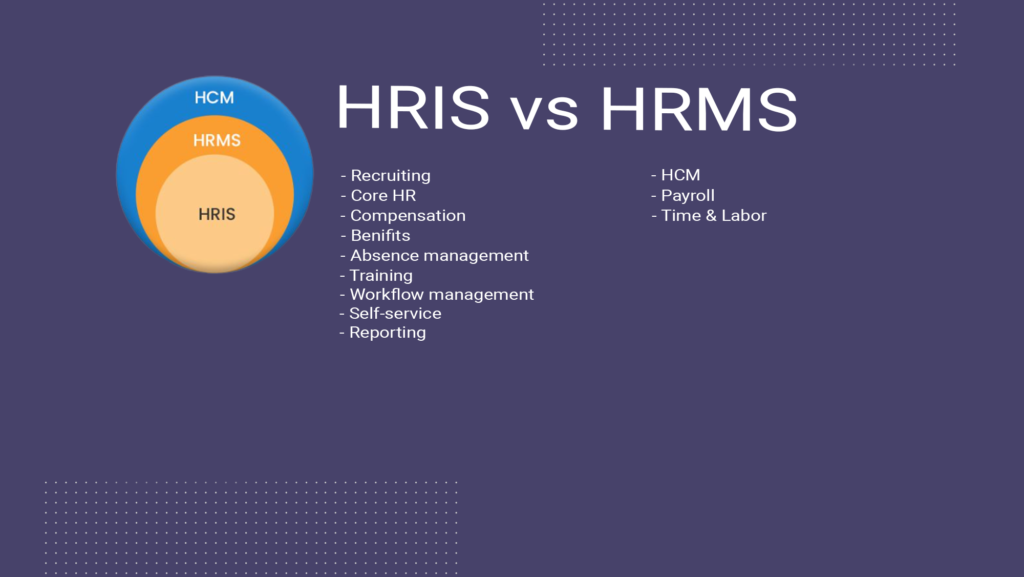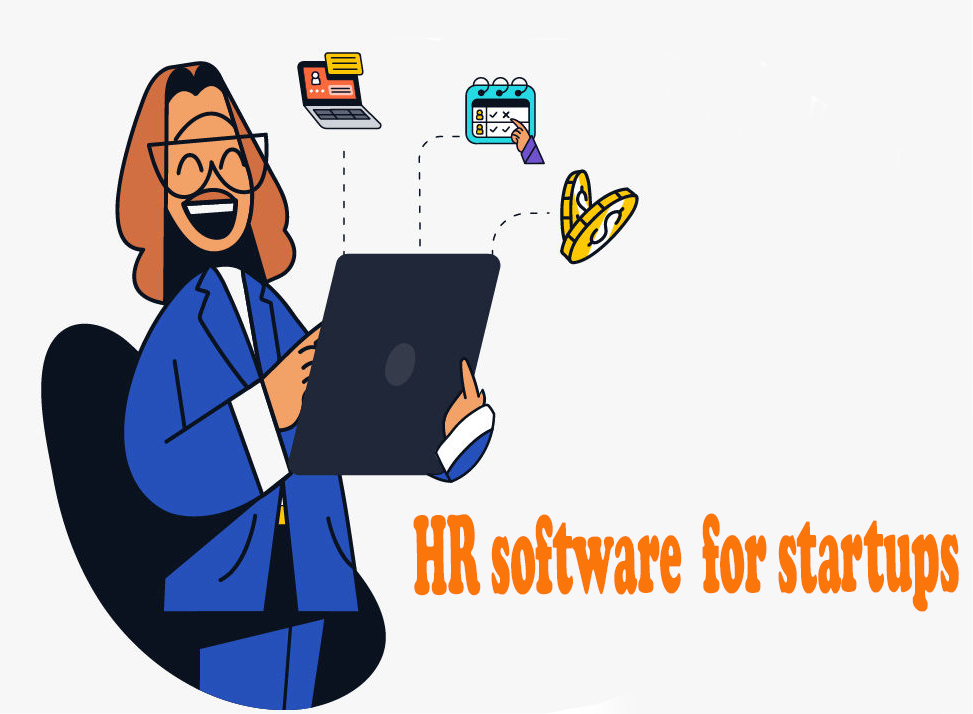Choosing between an HRMS vs. HRIS can seem like a complex task, especially when you’re trying to optimize your business’s HR functions.
Browsing through countless forums and LinkedIn posts, it’s easy to get overwhelmed by the sheer volume of information and differing opinions on these systems.
“You need an advanced system for effective management but don’t know which one suits your needs.” Does this sound familiar?
Comparing HRMS and HRIS can help determine which system best suits your organizational goals. The key lies in understanding how they align with your specific organizational goals.”Nearly 40% of businesses upgrade their HR software because they require more features.”— Software Path Survey
This statistic underscores the importance of
Decoding HRIS, HRMS, and HCM
HRMS vs. HRIS The human resources landscape has been significantly transformed by the advent of innovative software suites. These systems have revolutionized how businesses manage internal HR functions and streamlined their processes for improved efficiency.
We delve into three key types: Human Resources Information Systems (HRIS), Human Resources Management Systems (HRMS), and Human Capital Management (HCM) software.
In the world of technology-driven business operations, these are not mere acronyms but powerful tools that each bring unique features to address specific aspects of the human resources management system.
Exploring The Role Of An HRIS
An HRIS is often seen as a foundational tool in any organization’s tech stack. Its primary role involves processing detailed employee information such as payroll data and attendance records – core tasks essential to every company regardless of size or industry.
This type of system plays an instrumental part in standardizing HR tasks within organizations while freeing up professionals from routine administrative duties, allowing them to focus on more strategic roles driving organizational growth.
Navigating Through The Capabilities Of An HRMS System
HRMS vs. HRIS Moving beyond basic functionalities offered by an HRMS system, we find broader capabilities like performance management into opportunities with advanced reporting mechanisms extending far beyond simple payroll processing or attendance tracking.
A well-implemented HRMS helps HR professionals manage complex actions such as recruitment and performance analytics effectively, contributing towards efficient people management practices.
Taking A Comprehensive Approach With HCM Software
Last but certainly not least is the comprehensive approach taken by HCM software. This all-encompassing platform manages everything from day-to-day operations across teams within an organization, including lifecycle events which impact overall operational efficiency dramatically.
HCM goes even further, incorporating advancements like AI, facilitating collaboration while improving overall operational efficiency, offering predictive insights leading future trends in human resource departments recruiting globally.
Key Takeaway:
Choosing between HRIS, HRMS, and HCM can feel like navigating a tech-jargon maze. But remember: an HRIS is your basic tool for handling payroll and attendance; an HRMS ups the ante with performance management capabilities; while HCM goes full-throttle managing all aspects of human resources, even leveraging AI to predict future trends.
The Role of HRIS in Modern Businesses
HRMS vs. HRIS As we navigate the digital age, Human Resource Information Systems (HRIS) have emerged as an indispensable tool for businesses. Tasked with processing detailed employee information like payroll and attendance data, these systems are at the heart of modern human resources management.
No longer is it just about keeping records.
An efficient HRIS system doesn’t merely maintain standardization in routine tasks; it also frees up HR professionals to engage more actively in strategic roles within their organizations. By automating traditional administrative functions, this software suite has effectively transformed how we perceive and manage internal HR functions today.
Understanding How HRIS Tools Work
HRMS vs. HRIS A closer look into any standard HRIS solution would reveal its core functionality centered around managing comprehensive employee data efficiently. This includes personal details, job descriptions, along with benefits administration records among other things.
This sophisticated technology helps streamline workflows related to recruitment management or training & development planning amongst others by enabling companies to track all their employees’ details in one place, making retrieval easier when needed.
Differentiating Between Various Solutions
In a world where there is no dearth of options available, each offering unique functionalities – choosing between different solutions can be daunting initially, especially if you’re new to this field. However, understanding your specific requirements holds the key here.
Some businesses might require basic functionalities such as payroll processing, whereas larger ones might need advanced features encompassing talent acquisition modules depending upon the complexity of operations.
This guide can provide helpful guidance for selecting the right software to meet your business’s needs.
Navigating the digital age with HRIS at your side. Streamline workflows, manage employee data efficiently and transform how you perceive internal HR functions. Choose wisely for your business needs. #HRIS #DigitalTransformationClick to Tweet
Unpacking the Extended Capabilities of an HRMS System
An HRMS, or Human Resources Management System, is a step up from your basic HRIS. This robust system doesn’t just handle administrative tasks—it brings much more to the table.
The primary role of these advanced HRMS systems?
To streamline complex processes within human resources departments, recruiting new talent, and managing existing staff. It covers everything from performance management to opportunities for growth and reporting on key metrics.
The Impact of an Effective HRMS on Employee Experience
HRMS vs. HRIS A well-executed Human Resources Management System can drastically enhance employee experience. How? By fostering efficient people management practices that encourage open communication between employees and managers.
In addition to helping manage internal HR functions like payroll processing or time tracking effectively, modern-day HRMS systems are designed with user-friendly interfaces that allow employees easy access to their personal data—promoting self-service capabilities in today’s fast-paced business environment.
This shift towards automation frees HR professionals from routine administrative duties, allowing them to focus on strategic initiatives aimed at improving overall company performance—an important aspect considering emerging trends in AI capabilities and predictive analytics impacting businesses globally.
Moving beyond traditional methods used by human resources departments when handling personnel-related activities has led organizations to improve accuracy across all areas related directly or indirectly with human capital management through the implementation of effective HCM software solutions.
Suffice it to say: A powerful HRMS has helped revolutionize how companies manage both simple operations such as payroll processing and intricate aspects including talent acquisition, while contributing positively to creating conducive working environments where every individual feels valued and appreciated.
Revolutionize your HR functions with an advanced HRMS system. Streamline complex processes, enhance employee experience and focus on strategic initiatives. Say goodbye to traditional methods and hello to accuracy & efficiency in human capital management. #HRMS #BusinessGrowthClick to Tweet
The Comprehensive Approach of HCM Software
HRMS vs. HRIS Human Capital Management (HCM) software represents the pinnacle in HR technology. Unlike its counterparts, HRIS and HRMS systems, it provides a comprehensive solution that covers every stage of an employee’s lifecycle – from recruitment to retirement.
Harnessing Advanced Technologies for Streamlined Operations
Incorporating cutting-edge technologies like artificial intelligence (AI) and predictive analytics, HCM solutions not only automate routine tasks but also generate valuable insights for strategic decision-making. This all-encompassing approach enables businesses to manage their human capital more efficiently while fostering innovation through data-driven strategies.
Transforming Performance Management into Opportunities with HCM
An effective HCM system goes beyond traditional administrative functions by turning performance management processes into opportunities for engagement and productivity enhancement. Real-time tracking of employee progress coupled with immediate feedback mechanisms can drive significant improvements in overall organizational performance.
Besides this, many advanced tools within these systems are capable of identifying skill gaps among employees and suggesting targeted training programs accordingly. Such proactive people management practices help organizations nurture talent internally – offering a cost-effective strategy that simultaneously boosts morale by demonstrating investment in staff development.
Fostering Collaboration Across Teams With Social Tools
Apart from streamlining operations and enhancing individual performances, some modern-day Human Capital Management software suites incorporate social collaboration tools designed to foster teamwork across departments or even geographical locations.
These platforms enable communication channels beyond email chains or formal meetings – promoting open dialogue that fuels innovation while strengthening company culture.
All these aspects combined make Human Capital Management software an essential asset for modern businesses striving towards operational excellence while fostering positive workplace environments where employees feel valued at all times.
However, implementing such comprehensive systems requires careful planning due to their complexity compared to standalone HRIS or HRMS solutions; thus making them more suitable for larger organizations with diverse needs spanning multiple business units and global operations.
Key Takeaway:
When it comes to HR technology, HCM software is king. It’s not just about managing personnel; it’s a comprehensive solution that covers the full employee lifecycle, fosters collaboration and innovation with advanced tech tools, transforms performance management into opportunities for growth, and nurtures talent internally. However, its complexity makes careful planning crucial before implementation.
Navigating the Selection of HRIS, HRMS, or HCM
HRMS vs. HRIS Deciding on an HR software suite is a pivotal choice that should be influenced by your organization’s unique needs. The decision between an HRIS, an HRMS, and HCM involves several key considerations.
Determining Your Business Needs for the Ideal Software Choice
The size and complexity of your business operations will largely influence whether you choose to implement an HRIS system. Smaller businesses with simpler processes may find that this foundational tool offers sufficient functionality to manage employee data and standardize basic administrative tasks.
Larger organizations with more complex human resources departments might benefit from the additional features offered by HRMS systems, such as performance management and benefits administration. An effective HRMS can help manage internal functions, freeing up professionals to focus on strategic roles within the company.
If you’re considering integrating all aspects of people management in one place – including recruitment, training development, payroll processing, etc. – then a comprehensive Human Capital Management (HCM) solution would be ideal. These advanced tools provide extensive support for collaborative work environments while also enhancing the overall employee experience through efficient people management practices.
Budget constraints are another critical factor during this process. While some solutions offer robust capabilities at a higher price point, others might have fewer features but come at a lower cost, which could align better depending on your financial limitations.
In conclusion, it’s important not just to consider present requirements but also future growth plans when choosing between these three types of systems to avoid any major overhaul down the line due to their inability to scale effectively.
Choosing between HRIS, HRMS, or HCM for your business? Consider the size and complexity of operations, budget constraints & future growth plans. The right system can optimize HR functions and boost productivity. #HRSoftware #BusinessGrowthClick to Tweet
Case Studies – Successful Implementations Across Different Industries
The world of HR software is as diverse and dynamic as the industries it serves. A deep dive into real-life case studies reveals how businesses across sectors have leveraged these systems to streamline their human resources departments, manage internal HR functions effectively, and enhance overall performance.
Overcoming Challenges During Implementation
Navigating through the implementation phase can be a daunting task with its own set of challenges. However, strategic planning and effective management can turn this process into an opportunity for significant growth. Let’s take a look at some examples.
A renowned retail chain was grappling with managing employee data scattered across multiple stores due to disjointed systems. The introduction of an advanced HRMS system streamlined their processes while enhancing decision-making capabilities through robust reporting features.
In another scenario, a rapidly growing global tech firm found talent acquisition and retention increasingly challenging amidst expansion plans. By implementing state-of-the-art HCM solution that incorporates AI capabilities among others they were able not only automate traditional administrative tasks but also significantly improve employee experience by offering personalized career development opportunities along with innovative rewards programs.
Sector-Specific Successes With Human Resources Software Suites
Different sectors face unique challenges requiring tailored solutions for optimal results using various types of hr software suites including hris tools or hcm software depending on specific needs.
The healthcare industry often wrestles high turnover rates coupled stringent compliance requirements which makes people management quite difficult . An established hospital network managed overcome these hurdles deploying comprehensive HRIS tool,. This led better staff scheduling , reduced overtime costs increased compliance levels ultimately resulting improved patient care quality scores.
An international non-profit organization dealing diversified workforce spread over numerous countries faced difficulties in managing internal hr functions efficiently via conventional methods . Transitioning all-encompassingHCM suite,, They experienced noticeable improvements in aspects ranging from recruitment procedures benefits administration performance management fostering greater job satisfaction amongst employees worldwide.
Key Takeaway:
HR software, be it HRMS or HRIS, can significantly streamline business processes across industries. By overcoming implementation challenges and tailoring solutions to specific sector needs, companies can optimize internal functions like recruitment and performance management while enhancing employee satisfaction.
Future Trends in Human Resources Software Suites
Advances like AI capacities and prescient investigation are getting progressively regular in HRM frameworks, HRIS apparatuses, and HCM programming.
A new era of Artificial Intelligence
Innovation has become synonymous with artificial intelligence. Its integration into HR functions like recruitment, employee engagement, or performance management offers a transformative approach to traditional administrative tasks.
This technology not only automates mundane processes but also brings forth data-driven insights about workforce trends that can guide strategic decisions for businesses globally.
Another trend gaining momentum is using comprehensive employee data for informed decision making. As these platforms advance, they’re now capable of processing detailed employee information at an unprecedented scale.
These real-time analyses allow companies to make well-informed choices regarding hiring practices, compensation plans, or benefits administration which were earlier based on intuition or outdated methods.
Prioritizing Employee Wellness Programs
Moving beyond just managing internal HR functions, there’s a growing focus towards incorporating wellness programs aimed at improving both physical health and mental wellbeing – especially significant considering the widespread adoption of remote work culture post-pandemic.
Hence, integrating features like fitness challenges or mindfulness sessions through advanced HCM solutions doesn’t merely boost morale but significantly enhances productivity levels across organizations too.
Leveraging Predictive Analytics and People Analytics
No longer do we rely solely upon traditional approaches. Today’s sophisticated HCM software leverages predictive analytics enabling proactive people strategies by predicting turnover rates or identifying high-performing individuals who might be at risk of leaving the company soon.
Explore the future of HR software. From AI integration to predictive analytics, these tools are transforming traditional HR tasks. They’re not just about admin anymore – they’re also boosting productivity with wellness programs and data-driven insights. #HRtech #FutureOfWorkClick to Tweet
Conclusion
Deciphering the world of HR software suites is no small feat.
You’ve journeyed through the labyrinth of HRIS, HRMS, and HCM systems.
The fundamental differences are now clear as day – from processing employee data to managing complex actions like recruitment management and performance analytics.
HR Software Scalability A Key to Business Growth
HRIS has proven its worth in maintaining standardization in tasks. Meanwhile, an effective HRMS can revolutionize your people management practices.
And let’s not forget about the comprehensive approach offered by HCM software – transforming administrative tasks into opportunities for engagement and business value creation!
Your next step? Evaluating your specific needs to choose between these three powerful tools: HRMS vs. HRIS or even a broader HCM solution?
No matter what you decide, remember that each system carries potential for significant improvements in efficiency and productivity within your organization.
If you want to learn more about this, sign up for my newsletter.


